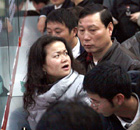Global General
Yemen claims 34 killed in raid on Qaida hide-outs
(Agencies)
Updated: 2009-12-18 05:56
 |
Large Medium Small |
SAN'A, Yemen:Yemeni security forces struck suspected al-Qaida hide-outs and training sites Thursday, and officials said at least 34 militants were killed, in an unusually heavy assault as Washington presses the deeply unstable country for tougher action against the terror network.
Witnesses, however, put the number killed at over 60 in the heaviest strike and said the dead were mostly civilians, including women and children. They denied the target was an al-Qaida stronghold, and one provincial official said only 10 militant suspects died.
The differing accounts raised questions over the seriousness of the government campaign. The United States has repeatedly called on Yemen to take stronger action against al-Qaida, whose fighters have increasingly found refuge here in the past year. Worries over the growing presence are compounded by fears that Yemen could collapse into turmoil from its multiple conflicts and increasing poverty and become another Afghanistan, giving the militants even freer rein.
If that happens, al-Qaida would have a foothold bordering U.S. ally Saudi Arabia and near other oil-rich states. Already militants in Yemen have crossed into Saudi Arabia to conduct some operations, including an attempt this year to assassinate the deputy interior minister.
Moreover, Yemen is located on a strategic maritime crossroad at the Red Sea and Gulf of Aden, the access point to the Suez Canal - and across the Gulf is Somalia, an even more tumultuous nation where the U.S. has said al-Qaida militants have been increasing their activity.
At the same time, Yemen's government is facing an escalating war with Shiite rebels in the north and clashes with separatists in the south. The San'a government already has little control in much of the mountainous nation, the poorest in the Arab world, where tribes hold sway.
In Thursday's biggest assault, warplanes and security forces on the ground attacked what authorities said was an al-Qaida training camp in the area of Mahsad in the southern province of Abyan. Saleh el-Shamsy, a provincial security official, said at least 30 suspected militants were killed.
Elsewhere, government forces killed four would-be suicide bombers and arrested 17 militants in a raid in the Arhab district northeast of the capital, the Interior Ministry said. The bombers "planned to strike at schools as well as interests at home and abroad," the ministry said, without elaborating.
But residents of Abyan said there was no al-Qaida training camp in the area and said the heavy assault had destroyed homes in the rural, tribal area, a collection of small mud-brick houses, huts and tents. Abbas al-Assal, a local human rights activist who was at the scene, said 64 people were killed, including 23 children and 17 women.
"The government wants to show the world that it is serious in pursuing al-Qaida elements and that the south of Yemen is a refuge for al-Qaida. That is not true at all," al-Assal told The Associated Press by telephone.
A resident of the area, Ali Mohammed Mansour, gave similar casualty figures, saying he helped bury the dead in a mass grave.
Abyan's deputy governor, Mohammed Hazran, said 10 al-Qaida suspects were killed in the attack, including Mohammed Saleh al-Kazemi, a Saudi who had came to the country after fighting in Afghanistan and was imprisoned in Yemen for two years before being released in 2005.
A provincial security official said "grave mistakes occurred in the operation due to failures of information, which led to a large number of civilian deaths." The official, who spoke on condition of anonymity because of the sensitivity of the situation, said the assault was carried out without consulting with local officials.
Mansour, the resident, dismissed claims the site was a training camp, pointing out that the community was only 100 meters (yards) off a major highway and two kilometers (1.6 miles) from an army base. He said al-Kazemi, the slain militant, had lived there with his family since his release and was not in hiding.
"If he was wanted, why didn't the authorities come and arrest him all this time?" he said.
Christopher Boucek, a Yemen expert at the Washington-based Carnegie Endowment for International Peace, said the government's "heavy-handed" methods. "There are a lot of ... innocents who suffer."
He said Yemen is under pressure to crack down against al-Qaida not only from the United States but also from Gulf countries. "The Americans are very concerned with what is happening in Yemen, and terror experts talk about Yemen as a trouble spot second only to Afghanistan and Pakistan," Boucek said.
Al-Qaida fighters, many of them coming from the war zones in Iraq and Afghanistan, are believed to have found refuge among tribes disgruntled with the central government - particularly in the northeast of the country, a trio of provinces bordering Saudi Arabia known as the "triangle of evil." The south has seen less al-Qaida activity in the past year.
The country was scene of one of al-Qaida's most dramatic pre-9/11 attacks, the 2000 suicide bombing of the destroyer USS Cole off the Aden coast that killed 17 American sailors. The government allied itself with Washington in the war on terror, but U.S officials have complained that it often strikes deals with militants.
In recent months, Yemen has been more focused on its war with the Shiite rebels, known as the Hawthis, which Boucek warned "is rapidly accelerating Yemen's economic collapse."
"The international community wants them to focus on the issue that affects them, which is terrorism," Boucek said. "But the longer the war goes on (with the Hawthis) the weaker the government looks."






